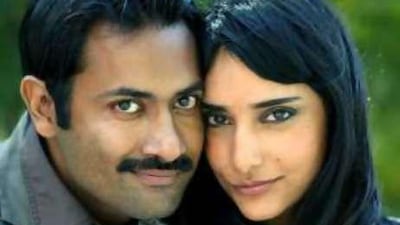From the perspective of the journalist, directors seem to have all the luck at the Dubai International Film Festival: they sleep in late, take suites at the Al Qasr, swank about at the galas and get showered with freebies. Who wouldn't want to be a director? Well, I've thought about it and I wouldn't. "It's a long process, you know?" sighs Amyn Kaderali. "I wrote this in 2004, raised the money in 2005, shot it in 2006, edited it in 2007. It's a long haul. You have to keep the energy going all the time." He closes his eyes for a moment. "It's not easy."
Kaderali is behind the Indo-American independent comedy Kissing Cousins. It tells the story of a bachelor who believes so little in love that he works as a "relationship-termination specialist" - that is, until his cousin turns up from England and his heart begins to thaw. The film is Kaderali's first but the charm of his script meant that minor stars were queuing up to appear in it: the two leads, Samrat Chakrabarti and the Anglo-Indian actress Rebecca Hazlewood, both have oodles of TV credits. Other cast members are better established still: Zack Ward, PJ Byrne, the comedian David Alan Grier. Of the last, Kaderali explains: "One of my producers sent him the script just to see what he thought of it, and he said: 'Who's playing the griller? I'll do it'."
The director's CV can't have hurt: if Martin Scorsese calls one of your short films "simply excellent", you are probably going places. However it turns out that between lies a chasm. "I wrote it, directed it, produced it - with another producer - I did the hand-doubles, got the coffee," says Kaderali. "You know, on an independent movie you do everything. I even made this press kit for you." They couldn't raise a shooting budget but had to start anyway. Investment trickled in a bit at a time. His star posed additional problems: "Rebecca is a bit of a klutz, so we were always trying to make sure she didn't crack her head open."
Compared to some, Kaderali's initiation into the world of feature production was blessedly free from mishap: the shoot didn't collapse, no one died and the final product is going down a storm. But it was still four years of sleeplessness and heartache, all to make 98 minutes of screwball entertainment. Would he do it again? "Oh that's the crazy part," he laughs. "Yeah, I'm ready to do the next one right now."
There were more hardscrabble stories during a symposium intended to explain Moroccan cinema's recent growth spurt. Between 1959 and 1998 around 100 films were made in the country; now that number has risen to about 20 films a year and the quality is remarkable. The industry is taking an interest, too: it is rumoured that Nour-Eddine Lakhmari's film, Casanegra, which is debuting at the DIFF, is the most-watched picture in the market room. How is all this happening? Alas, by the end of the discussion, the mystery was deeper than ever.
"I have absolutely no idea how I end up being able to finance my stuff," said Hakim Belabbes, director of Hazihi Al-Ayadi (These Hands). "I know that every time I've submitted my projects to the CCM - the institution which is supposed to fund and regulate the industry in Morocco, I was rejected." Leila Kilani, director of Nos Lieux Interdits (Our Forbidden Places), told how she marched into the Centre Cinématographique Marocain and made its officials show her in writing where it said they couldn't fund a documentary. Nowhere. They paid out, but the loophole was rapidly closed.
"We make films in spite of the CCM," Belabbes said. "We make films in spite of some really stupid rules that are remnants of some laws that we are told are French, that I know the French don't even use any more ? It's like Kafka ? it's a system that is literally asphyxiating us." The funding body seems to have alienated this crop of filmmakers altogether. So just what is driving them? Irritation at existing portrayals of Morocco, by the sound of it. As Lakhmari explained: "If you don't see camels you see donkeys. If you don't see donkeys you see Arabs with snakes and two teeth. We're sick and tired of those images."
"For the longest time we've been taught that our stories don't matter. We've been told that by the colonisers. I think the process now is maybe one of starting to open up to our own narratives," said Belabbes.
A renaissance powered by artists alone? In the word of Ambrose Bierce, can such things be? Either way, there can be no doubt that something remarkable is happening in north Africa.
elake@thenational.ae

